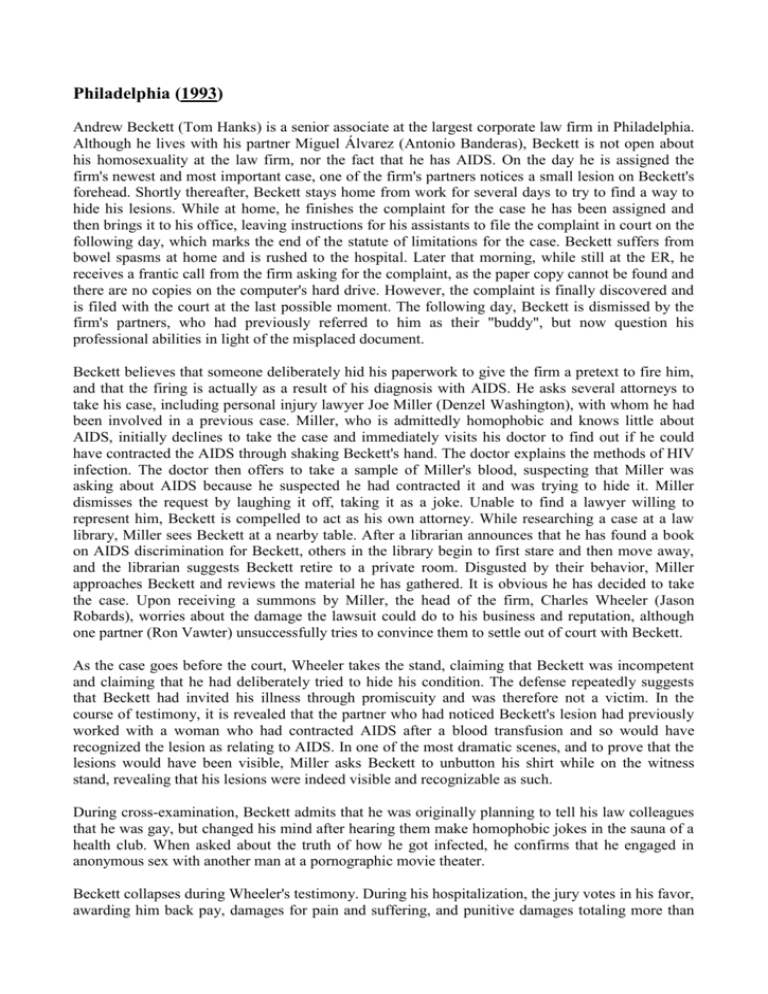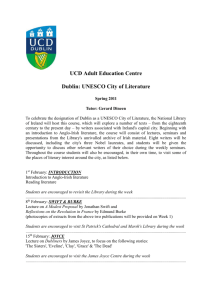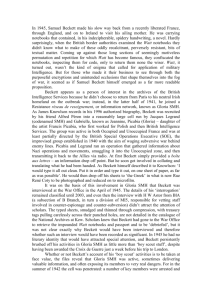Philadelphia (1993) Andrew Beckett (Tom Hanks) is a senior
advertisement

Philadelphia (1993) Andrew Beckett (Tom Hanks) is a senior associate at the largest corporate law firm in Philadelphia. Although he lives with his partner Miguel Álvarez (Antonio Banderas), Beckett is not open about his homosexuality at the law firm, nor the fact that he has AIDS. On the day he is assigned the firm's newest and most important case, one of the firm's partners notices a small lesion on Beckett's forehead. Shortly thereafter, Beckett stays home from work for several days to try to find a way to hide his lesions. While at home, he finishes the complaint for the case he has been assigned and then brings it to his office, leaving instructions for his assistants to file the complaint in court on the following day, which marks the end of the statute of limitations for the case. Beckett suffers from bowel spasms at home and is rushed to the hospital. Later that morning, while still at the ER, he receives a frantic call from the firm asking for the complaint, as the paper copy cannot be found and there are no copies on the computer's hard drive. However, the complaint is finally discovered and is filed with the court at the last possible moment. The following day, Beckett is dismissed by the firm's partners, who had previously referred to him as their "buddy", but now question his professional abilities in light of the misplaced document. Beckett believes that someone deliberately hid his paperwork to give the firm a pretext to fire him, and that the firing is actually as a result of his diagnosis with AIDS. He asks several attorneys to take his case, including personal injury lawyer Joe Miller (Denzel Washington), with whom he had been involved in a previous case. Miller, who is admittedly homophobic and knows little about AIDS, initially declines to take the case and immediately visits his doctor to find out if he could have contracted the AIDS through shaking Beckett's hand. The doctor explains the methods of HIV infection. The doctor then offers to take a sample of Miller's blood, suspecting that Miller was asking about AIDS because he suspected he had contracted it and was trying to hide it. Miller dismisses the request by laughing it off, taking it as a joke. Unable to find a lawyer willing to represent him, Beckett is compelled to act as his own attorney. While researching a case at a law library, Miller sees Beckett at a nearby table. After a librarian announces that he has found a book on AIDS discrimination for Beckett, others in the library begin to first stare and then move away, and the librarian suggests Beckett retire to a private room. Disgusted by their behavior, Miller approaches Beckett and reviews the material he has gathered. It is obvious he has decided to take the case. Upon receiving a summons by Miller, the head of the firm, Charles Wheeler (Jason Robards), worries about the damage the lawsuit could do to his business and reputation, although one partner (Ron Vawter) unsuccessfully tries to convince them to settle out of court with Beckett. As the case goes before the court, Wheeler takes the stand, claiming that Beckett was incompetent and claiming that he had deliberately tried to hide his condition. The defense repeatedly suggests that Beckett had invited his illness through promiscuity and was therefore not a victim. In the course of testimony, it is revealed that the partner who had noticed Beckett's lesion had previously worked with a woman who had contracted AIDS after a blood transfusion and so would have recognized the lesion as relating to AIDS. In one of the most dramatic scenes, and to prove that the lesions would have been visible, Miller asks Beckett to unbutton his shirt while on the witness stand, revealing that his lesions were indeed visible and recognizable as such. During cross-examination, Beckett admits that he was originally planning to tell his law colleagues that he was gay, but changed his mind after hearing them make homophobic jokes in the sauna of a health club. When asked about the truth of how he got infected, he confirms that he engaged in anonymous sex with another man at a pornographic movie theater. Beckett collapses during Wheeler's testimony. During his hospitalization, the jury votes in his favor, awarding him back pay, damages for pain and suffering, and punitive damages totaling more than $5M. Miller visits Beckett in the hospital after the verdict and overcomes his fear enough to touch Beckett's face. After Beckett's family leaves the room, he tells Miguel that he is ready to die. A short scene immediately afterward shows Miller getting the word that Beckett has died. The movie ends with a reception at Beckett's home following the funeral, where many mourners, including the Millers, view home movies of Beckett as a healthy child. Cast Tom Hanks as Andrew Beckett Denzel Washington as Joe Miller Jason Robards as Charles Wheeler Antonio Banderas as Miguel Álvarez Joanne Woodward as Sarah Beckett Robert W. Castle as Bud Beckett[2] Mary Steenburgen as Belinda Conine Ann Dowd as Jill Beckett Charles Napier as Judge Garnett Roberta Maxwell as Judge Tate Buzz Kilman as Crutches Karen Finley as Dr. Gillman Robert Ridgely as Walter Kenton Bradley Whitford as Jamey Collins Ron Vawter as Bob Seidman Anna Deavere Smith as Anthea Burton Tracey Walter as Librarian Julius Erving as himself Ed Rendell as Ed Rendell Chandra Wilson as Chandra David Drake as Bruno Roger Corman as Mr. Laird Memorable quotes (with notes on difficult vocabulary) Joe Miller: Some of these people make me sick. But a law's been broken here. You do remember the law, don't you? to make sb sick = far vomitare qc; qui: fare schifo Librarian: Sir, wouldn't you be more comfortable in a study room? [Andrew looks up and sees people in the library staring at him] Andrew Beckett: No. Would it make you more comfortable? To be comfortable = sentirsi a proprio agio [Joe Miller is in court and has just asked his witness whether he is a homosexual] Joe Miller: Are you a homo? Are you a queer? Are you a faggot? Are you a fruit? Are you *gay*, sir? Homo/queer/faggot/fruit = termini eufemistici o slang (quindi politicamente scorretti) per indicare un omosessuale Joe Miller: We're standing here in Philadelphia, the, uh, city of brotherly love, the birthplace of freedom, where the, uh, founding fathers authored the Declaration of Independence, and I don't recall that glorious document saying anything about all straight men are created equal. I believe it says all men are created equal. To recall = ricordare Andrew Beckett: What do you call a thousand lawyers chained together at the bottom of the ocean? Joe Miller: I don't know. Andrew Beckett: A good start. A good start = un buon inizio Joe Miller: Have you ever felt discriminated against at Wyatt Wheeler? Anthea Burton: Well, yes. Joe Miller: In what way? Anthea Burton: Well, Mr. Wheeler's secretary, Lydia, said that Mr. Wheeler had a problem with my earrings. Joe Miller: Really? Anthea Burton: Apparently Mr. Wheeler felt that they were too..."Ethnic" is the word she used. And she told me that he said that he would like it if I wore something a little less garish, a little smaller, and more "American." Joe Miller: What'd you say? Anthea Burton: I said my earrings are American. They're African-American. Garish = appariscente, pacchiano Joe Miller: What do you love about the law, Andrew? Andrew Beckett: I... many things... uh... uh... What I love the most about the law? Joe Miller: Yeah. Andrew Beckett: It's that every now and again - not often, but occasionally - you get to be a part of justice being done. That really is quite a thrill when that happens. thrill = emozione, eccitazione, brivido [Andrew transcendentally describes his favorite opera] Andrew Beckett: Do you like opera? Joe Miller: I'm not that familiar with opera. Andrew Beckett: This is my favorite aria. This is Maria Callas. This is "Andrea Chenier", Umberto Giordano. This is Madeleine. She's saying how during the French Revolution, a mob set fire to her house, and her mother died... saving her. "Look, the place that cradled me is burning." Can you hear the heartache in her voice? Can you feel it, Joe? In come the strings, and it changes everything. The music fills with a hope, and that'll change again. Listen... listen..."I bring sorrow to those who love me." Oh, that single cello! "It was during this sorrow that love came to me." A voice filled with harmony. It says, "Live still, I am life. Heaven is in your eyes. Is everything around you just the blood and mud? I am divine. I am oblivion. I am the god... that comes down from the heavens, and makes of the Earth a heaven. I am love!... I am love." mob = folla, massa; Can you hear the heartache? = senti come le piange il cuore/senti il suo dolore?; strings = (qui) strumenti a corda; mud = fango; oblivion = oblio Fonte: http://www.imdb.com/title/tt0107818/?ref_=sr_2 http://en.wikipedia.org/wiki/Philadelphia_%28film%29







